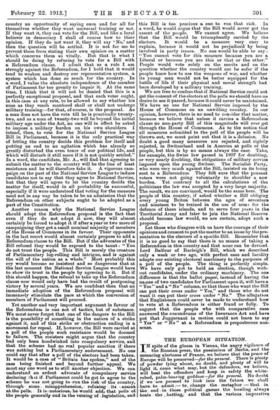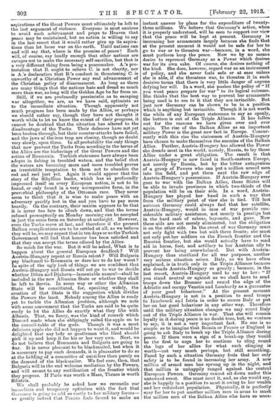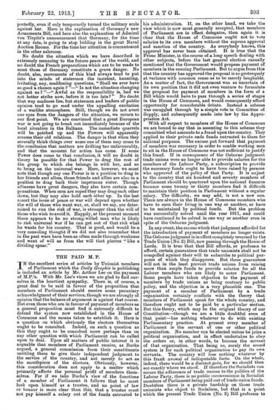THE EUROPEAN SITUATION.
IN spite of the gloom in Vienna, the angry vigilance of the Russian press, the pessimism of Berlin, and the menacing alertness of France, we believe that the peace of Europe will be preserved—for the present. There is plenty of powder lying about, no doubt, and plenty of will to light it, come what may, but the defenders, we believe, will beat the offenders and keep in safety the white- robed, palm-bearing goddess—for the present. No doubt if we are pressed -to • look into the future we shall have.. to-- admit,— to, change the metaphor — that in the end • in these political .games the bowling always beats the batting, and that the various, imperative aspirations of the Great Powers must ultimately be left to the last argument of violence. Everyone is most anxious to avoid such arbitrament and prays to Heaven that peace may be maintained, but no nation is willing to say in the last resort that it would rather give up its aspira- tions than let loose war on the earth. Until nations can and will say that, where is the promise of peace i' Each will, of course, say loudly enough that other nations are savages not to make the necessary self-sacrifice, but that is a very different thing from being a peacemaker. A.'s pro- testation that B. ought to relieve C. is not charity, nor is A.'s declaration that B.'s conduct in threatening C. is unworthy of a Christian Power any real advancement of the Christian policy of disarmament. As long as there are many things that the nations hate and dread so much more than war, so long will the Golden Age be far from us.
Still, if we are profoundly pessimistic as to escaping war altogether, we are, as we have said, optimists as to the immediate situation. Though apparently not much progress has been made by the Allies, or perhaps we should rather say, though they have not thought it worth while to let us know the extent of their progress, it cannot be doubted that the situation has altered to the disadvantage of the Turks. Their defences have not yet been broken through, but their counter-attacks have failed, and the jaws of the iron trap are closing, though no doubt -very slowly, upon them. In all probability the only things that now prevent the Turks from acceding to the terms of the Allies are the bickerings of the Great Powers and the action of Roumania. Turkish statesmen have always been adepts in fishing in troubled waters, and the belief that the waters are becoming more and more troubled proves an irresistible temptation to them not to abandon the rod and reel just yet. Again it would appear that the story of the Sibylline books, which has so profoundly impressed itself on every European nation, is not to be found, or only found in a very unimpressive form, in the proverbial philosophy of the Ottoman race. They never seem to think that it is wise to make peace with an adversary quickly lest in the end you have to pay more heavily. On the contrary, their maxim appears to be that it is never too late to climb down, and that the terms refused peremptorily on Monday morning can be accepted in just the same form on Saturday at midnight. However, even the Turks move at last, and therefore if the present Balkan complications are to be settled at all, as we believe they will be, we may expect that in ten days or so the Turkish Government will find that honour has been satisfied and that they can accept the terms offered by the Allies.
So much for the war. But it will be asked, What is to happen about the general European deadlock ? Will Austria-Hungary repent or Russia relent ? Will Bulgaria pay blackmail to Roumania or dare her to do her worst ? In spite of the ugly look of things we are confident that Austria-Hungary and Russia will not go to war to decide whether Dibra and Djakova—lamentable names!—shall be included in the new Albanian State or whether they shall be left to Servia. In some way or other the Albanian State will be constituted, for, speaking widely, the creation of that State is the suggestion which divides the Powers the least. Nobody among the Allies is ready yet to tackle the Albanian problem, although we note with some amusement that the Turks are said to be quite ready to let the Allies do exactly what they like with Albania. That, we fancy, was the kind of remark which Discord made when she obligingly rolled the apple on to the council-table of the gods. Though it was a most delicious apple she did not happen to want it, and would be delighted that any lady or gentleman who liked should pick it up and keep it for his or her very own. Next, we do not believe that Roumania and Bulgaria are going to War. It is never pleasant to be blackmailed, but when it is necessary to pay such demands, it is pleasanter to do so at the bidding of a committee of outsiders than purely on the demand of the blackmailer. We feel sure, then, that Bulgaria will in the end welcome mediation by the Powers, and will assent to any rectification of the frontier which they propose. If Paris was worth a Mass, Thrace is worth Silistria.
We shall probably be asked how we reconcile our immediate and temporary optimism with the fact that Germany is going to add so vastly to her military forces— so greatly indeed that Franca feels forced to make an instant answer by plans for the expenditure of twenty- three millions. We believe that Germany's action, when it is properly understood, will be seen to support our view that the peace will be kept at present. Germany is Increasing her armaments largely because she finds that at the present moment it would not be safe for her to go to war or to threaten war—because, in a word, she must perforce keep the peace. Now we by no means desire to represent Germany as a Power which desires war for its own sake. Of course, she desires nothing of the kind. She does, however, regard war as an instrument of policy, and she never feels safe or at ease unless she is able, if she threatens war, to threaten it in such decisive terms that there is very little danger of anyone defying her will. In a, word, she pushes the policy of " If you want peace prepare for war " to its logical extreme. She thinks that the best way to prevent her armaments being used is to see to it that they are invincible. But just now Germany can be shown to be in a position which is anything but invincible. Though it is not worth the while of any European statesman to say so openly, the bottom is out of the Triple Alliance. It has fallen out for the reasons we have given over and over again. The rise of the Balkan Allies as an important military Power is the great new fact in Europe. Concur- rently with this rise the statesmen of Austria-Hungary have chosen to make themselves the enemies of the Balkan Allies. Further, Austria-Hungary has allowed the Power she dreads most in the world, namely, Russia, to lay those Allies under a great obligation. The result is that Austria-Hungary is now faced in South-eastern Europe, not merely by Russia, but by the bitter antagonism of a group of Powers who can put a million armed men into the field, and put them next the raw edge of Austria-Hungary's possessions. If Austria-Hungary ever goes to war with the Balkan Allies, those States will be able to invade provinces in which two-thirds of the population will be on their side. In a word, Austria- Hungary has played her hand in such a way that from the military point of view she is tied. Till 'last autumn Germany .could always feel that her satellite, Austria-Hungary, would in case of war provide con- siderable military assistance, not merely in prestige but in the hard cash of sabres, bayonets, and guns. Now these aids are not merely eliminated, but the obligation is on the other side. In the event of war Germany must not only fight with two but with three fronts; she must not only put her soldiers on the French frontier and the Russian frontier, but she would actually have to send aid in horse, foot, and artillery to her Austrian ally to prevent her being overwhelmed. But with Austria- Hungary thus sterilized for all war purposes, another very serious situation arises. Italy, as we have often explained, is in truth only in the Triple Alliance because she dreads Austria-Hungary so greatly ; because, in the last resort, Austria-Hungary used to say to her : " If you stand neutral or against us we shall have to send troops down the Brenner and round the edge of the Adriatic and occupy Venetia and Lombardy as a guarantee of your good behaviour." At the present moment Austria-Hungary is not in a position to send troops to Innsbruck and Istria in order to coerce Italy or put her on her good behaviour in any other way. Therefore until the military situation changes we may count Italy out of the Triple Alliance in war. That she will remain loyally in it during peace is no doubt true, but, we venture to say, it is not a very important fact. No one is so simple as to imagine that Russia or France or England is going to ask Italy to break up the Triple Alliance during peace. If there were a sign of a break-up they would be the first to urge her to continue to cling round the legs of her allies for what such clinging is worth•—not very much perhaps, but still something. Faced by such a situation Germany feels that her only safety is to be found in increasing her army. A new million of armed men has sprung up in the night, and that million is unhappily ranged against the central European Powers. Germany cannot sit down under this untoward event. She must meet it, and, as she would say, she is happily in a position to meet it owing to her wealth and her redundant population. Physically, it is perfectly easy for her to put another million men in arms to mask the million men of the Balkan Allies who have so unex-
pectedly, even if only temporarily turned the military scale against her. Here is the explanation of Germany's new Armaments Bill, and here also the explanation of Admiral von Tirpitz's announcement that. Germany, for the time at any rate, is going to stop bidding in the great Naval Auction Rooms. For the time her attention is concentrated in the other saleroom.
No doubt the situation which we have described is extremely menacing to the future peace of the world, and no doubt the French preparations which are to be made to meet those of Germany constitute a grave danger. No doubt, also, movements of this kind always tend to put into the minds of statesmen the insistent, haunting, irritating, nay, maddening questions, " Shall we ever have so good a chance again ? "—" Is not the situation changing against us ? "—" Awful as the responsibility is, had we not better strike now, before it is too late ? " No doubt that way madness lies, but statesmen and leaders of public opinion tend to go mad under the appalling excitation of a warlike atmosphere. Still, though we do not avert our eyes from the dangers of the situation, we return to our first point. We are convinced that a great European war is not going to break out immediately because of the local situation in the Balkans. The immediate quarrels will be patched up and the Powers will apparently resume their old relations. The danger is that when they severally think things over some one of them may come to the conclusion that matters are drifting too unfavourably, and that the moment for action has come. If some Power does come to that conclusion, it will no doubt in theory be possible for that Power to drag the rest of the group to which she belongs in with her, and so to bring on the universal war. Here, however, we must note that though any one Power is in a position to drag in her friends and allies, those friends and allies arc also in a position to drag back their impetuous sister. Though allianees have great dangers, they also have certain com- pensations. When men are roped they may drag each other down, but they may also hold each other up. In the last resort the issue of peace or war will depend upon whether the will of those who want war, or, shall we say, are deter- mined to run the risk of war, is stronger than the will of those who wish to avoid it. Happily, at the present moment there appears to be no strong-willed man who is likely to risk universal war if he can get out of that risk what he wants for his country. That is good, and would be a very consoling thought if we did not also remember that in the past wars have been as often made through weakness and want of will as from the will that pierces " like a dividing spear."
















































 Previous page
Previous page